Look at this:

Look closer:

That’s right. I am being paid for my art.
Posts about my setting of Nancy Willard’s A Visit to William Blake’s Inn
There is a piece of music running through my head, and I do not want to write this blog post.
![]()
In the early 80s, probably 1983, I ordered a pre-bundled set of Newbery Award winners for the media center at East Coweta High School, because the collection I had inherited in 1980 was particularly weak on fiction.[1] One of the titles that I pulled from that box was the 1982 winner, A Visit to William Blake’s Inn, by Nancy Willard. I was a little nonplussed.
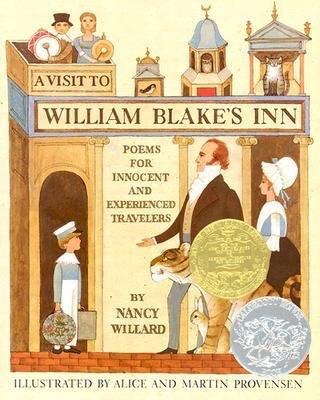
This was a picture book. Surely the Newbery committee had made a mistake. Then I opened it.
I will admit that the first thing that I loved about the book was the illustrations. They’re beautiful, muted gouache paintings with deft architectural fantasies and adorable animal portraits. (It was 2002 before I realized that Alice and Martin Provensen illustrated my favorite book as a child, The Color Kittens.)
Then I started to read it.
WHEN WE COME HOME, BLAKE CALLS FOR FIRE
Fire, you handsome creature, shine.
Let the hearth where I confine
your hissing tongues that rise and fall
be the home that warms us all.
When the wind assaults my doors
every corner’s cold but yours.
When the snow puts earth to sleep
let your bright behavior keep
all these little pilgrims warm.
They who never did you harm
raise their paws a little higher
and toast their toes, in praise of fire.
I was in love.
![]()
I began to set some of the poems to music. “When We Come Home, Blake Calls for Fire” was first. I know I did “William Blake’s Inn for Innocent and Experienced Travelers” and “The Tiger Asks Blake for a Bedtime Story” and “The Man in the Marmalade Hat Arrives” before I stopped. After all, I did not have the rights to create a song cycle from this book, and having received a firmly worded letter from Dr. Seuss’s estate when I asked permission for my one-act opera version of Green Eggs & Ham, I was not about to ask Nancy Willard. The work went into the “trunk.”
Fast forward to 2002, when I was retiring as artistic director of the Newnan Community Theatre Company. Having decided to go out in a blaze of glory, I translated The Marriage of Figaro, which was every bit as hard to pull off as you might imagine,[2] so when my lovely first wife came home from her book club to say that Bette had a project she wanted me to work on, I snapped, “Not until November 10!”, which I repeated to Bette herself when she immediately launched into her pitch the next time we met.
The project was to audition/train/accompany a dozen young people, ages 8–13, to an international get-together in our sister city of Ayr, Scotland. Other than airfare, all expenses would be paid. Well, OK, sure, why not?
The deal was that the Scottish Opera had this little touring thing, two adult singers and as many children as you could cram onstage, based on their national poem, “Tam O’Shanter,” by Robbie Burns. They had premiered it the year before, and Ayr was inviting all its sister cities to send kids to take part in it again. We were there with students from Norway, Germany, and of course Scotland. It was huge fun.
On the plane home, the adults in the party decided that Newnan could do the same thing, invite all our new friends to the U.S. to perform in some unidentified work. I remembered William Blake’s Inn. I opened my laptop, put on my headphones, and gave it a listen.
Hm, I thought, not bad.
When we got back home, we had a meeting of the interested adults and I played for them the pieces I had. They liked it. Let’s do it.
But that meant I had to ask Nancy Willard for her permission.
![]()
This inn belongs to William Blake…
I printed out the songs I had, made a CD of the fairly shabby MIDI realizations, and wrote a letter pleading for permission—or at the very least, hope that she wouldn’t sic her lawyers on me.
A couple of weeks later, there was email. nawillard@vassar.edu. I stopped breathing. I may have cried. I opened it.
Dale, good heavens–of course you have my permission. What a wonderful
gift appeared in the mail today–all those songs!
And that’s how I became friends with Nancy Willard.
![]()
It took me another couple of years to finish setting all the poems to music, and then I had to orchestrate it, so it was not until 2007 that we felt we were ready to put it front of the public. The whole time Nancy was generous and encouraging. And then we met her!
We had gone to New York and I emailed Nancy to see if she and Eric Lindbloom, her husband, could come down from Poughkeepsie to have lunch. They did, and she was exactly in person the way she was in correspondence and in all the videos and interviews I had seen of her: funny, kind, super-smart.
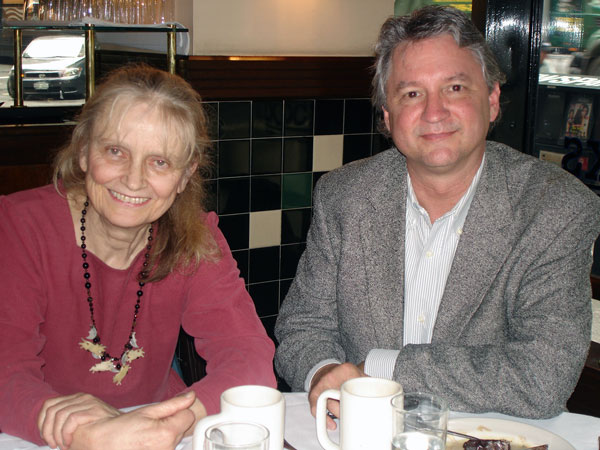
We discovered many shared habits, including that of writing ABORTIVE ATTEMPTS at the top of new work (she used the term WASTED EFFORTS). Finally, as we were parting, I pulled out the two copies of William Blake’s Inn, my original paperback and the hardback I had bought to put on display whenever we performed (so that I didn’t risk losing the copy I had composed from).
Oh, she said, she’d have to take them with her. My heart sank. What if I never got them back?
But no: she needed to take them home with her because she didn’t just autograph them. She painted in them.
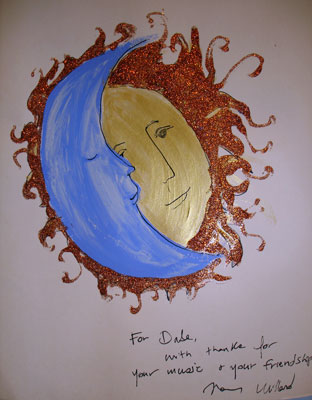
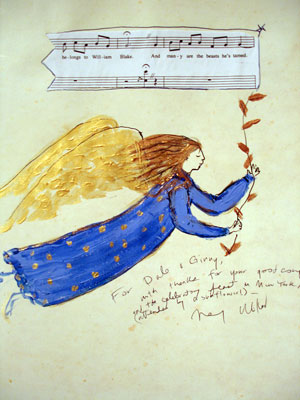
Make Believe,
and make it strong and clear…
![]()
Finally, on May 3, 2007, we had a “backers audition,” where my intrepid group of volunteers sang the whole work, with what we called a “cardboard and hot glue” staging of “The Man in the Marmalade Hat Arrives” and “Two Sunflowers Move Into the Yellow Room.” The idea was to get a commitment from various individuals/organizations in the community to actually stage the work for the international thing.
Everyone loved the music. No one stepped up to take on the project.
I will be honest: perhaps I could have done what I always do, which is to just do it all myself. But I refused. For one thing, I had a son in college; I didn’t have the cash to throw at the project (like I did with Figaro just to get it done right). For another, I was tired of all these “supporters of the arts” not actually supporting any arts. I was resentful. So we just put it on the back burner, where it has stayed.
Through the years, I’ve made a few feeble efforts: a friend gave it to the Lookingglass Theatre in Chicago, who passed it on to the Chicago Children’s Theatre, who passed it on to the Chicago Symphony, where I’m sure it was discarded. I’ve offered it to UGA, to the Springer, to the Center for Puppetry Arts. But no one’s interested. It’s too short (40+ min) for a mainstage show, and too complicated for a children’s piece. It was written as a song cycle for adult singers. It can’t really be done with just a piano; the later pieces were written for orchestra without going through the piano first. There is no script, no plot; whoever did it would have to do an enormous amount of development to flesh it out—which I think is the most interesting part about it. But I know it’s not an out-of-the-box piece.
And so it languishes.
![]()
Last spring, I emailed Nancy because I was working on Lichtenbergianism: procrastination as a creative strategy, and I couldn’t remember the term she used for Abortive Attempts. I got back an email from Eric, asking me to call him. Nancy had fallen the summer before. She was mostly bedridden and in decline. I didn’t share with anyone what I knew, because it was clear they were keeping it private. As Nancy said to Eric, “It’s not like it was before, is it?”
Then a couple of months ago I got an email from a teacher in Idaho. I-DA-HO, KENNETH. Could her small charter school perform William Blake’s Inn?
I wrote Nancy to tell her. And then I wrote her again last month to remind her that although she had always demurred at discussing financial arrangements for when those huge royalty checks started pouring in, I was reminding her that I had decreed that we would make it a 60/40 split.[4]
I got a letter, dated Feb 18, from Eric. Nancy was resting comfortably, still at home, but in hospice care.
Nancy Willard died the following day, Feb 19, 2017.
![]()
Part of my grief at losing her is that we never staged the work completely. I never staged the work completely. We never got to have her as a guest at the dazzling international premiere so that she could receive the tribute that she certainly deserved. I’m angry at the world, I’m angry at Newnan, I’m angry with myself. I failed my friend.
Now students at Moscow Charter School, in Moscow, ID, will be performing William Blake’s Inn in May. Are they capable of doing a fully staged production with orchestra? No, but here’s what I learned from Nancy Willard: if you’re given the gift, you give it again. Just as I was given the chance to create something new and beautiful from Nancy’s deeply meaningful poems, I look forward to seeing what those students come up with. I’m hoping to work with them via Skype to bring their ideas to life.
We’ll start our journey as children,/but I fear we will finish it old.
![]()
Now “Blake Leads a Walk on the Milky Way,” the great central piece of the entire work, won’t leave my head. Those opening chords, which return to such great effect in the “Epilogue,” keep up their chime, and the recapitulation at He gave silver stars to the Rabbit, with its unexpected and gorgeous major key take on the mysterious first theme—they’re on permanent loop, reminding me of the beautiful beautiful soul who gave me permission to create them. I know that if I listen too carefully, I will grieve outright. I’m okay with that.
My adventures now are ended.
I and all whom I befriended
from this holy hill must go
home to lives we left below.
Farewell cow and farewell cat,
rabbit, tiger, sullen rat.
To our children we shall say
how we walked the Milky Way.
You whose journeys now begin,
if you reach a lovely inn,
if a rabbit makes your bed,
if two dragons bake your bread,
rest a little for my sake,
and give my love to William Blake.
![]()
William Blake’s Inn can be found here.
—————
[1] My predecessor had righteously sniffed that a liberrary was for research. If the chillren wanted to read for fun, they could do that at home. The fact that most of our clientele came from homes without books seemed to be irrelevant to this woman.
[2] What made me think we could even do such a thing? A hugger-mugger performance of Green Eggs & Ham at a Reading[3] several years previously—I stole the joyous ending of the piece from the Act II finale of Figaro.
[3] I’ll explain some other time.
[4] Her resistance to business dealings was extraordinary. In her original email she pointed me to the rights department at Harcourt, the publisher of A Visit to William Blake’s Inn, where they explained to me that they didn’t own the copyright—she did.
The end of the Prelude:

The final 20 seconds or so…
As always, if these Abortive Attempt images intrigue you to the point that you want to know more about William Blake’s Inn, have at it.
More imagery of what my song cycle William Blake’s Inn might look like if some enterprising theatre company decided to stage it:

I’m thinking that at their first appearance, the Tiger and the King of Cats should probably be in their puppet avatar. The denizens of the Inn would move forward, perhaps; at any rate, they would “come to life.”
Musicallyspeakingwise, this is from 0:30–1:00.
I’ve done another 5–10 seconds of visualization for William Blake’s Inn, hereinafter known as WBI.
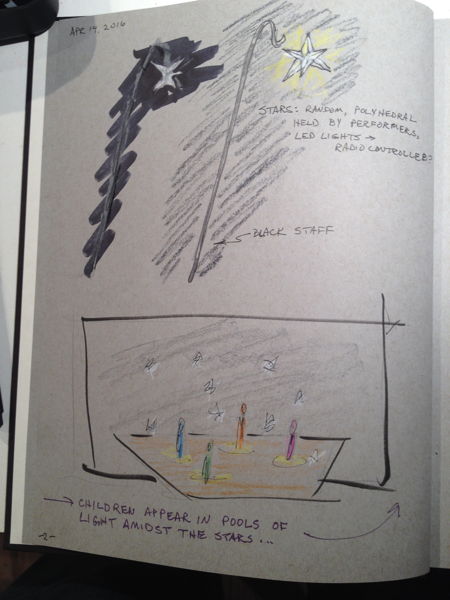
So, yes, the stars are puppets, in the sense that they are held aloft by performers. There are probably stationary stars in the backdrop, but these are mobile. You’ll see why tomorrow.
Again, the music:
The event pictured above is from 0:10–0:15, approximately.
So yesterday, in my ongoing efforts to do absolutely no work on Lichtenbergianism: procrastination as a creative strategy or any of my three musical compositions, I started a new project, an ABORTIVE ATTEMPTS notebook attempting to visualize what a staged production of William Blake’s Inn might look like.[1]
Using the ungodly amount of art supplies I have on hand, I just began with the Prelude, and before I knew it I had the first whole five seconds sketched. That means I now have o.2% of the entire work visualized. UNSTOPPABLE, that’s what I am.
Anyway, here it is:
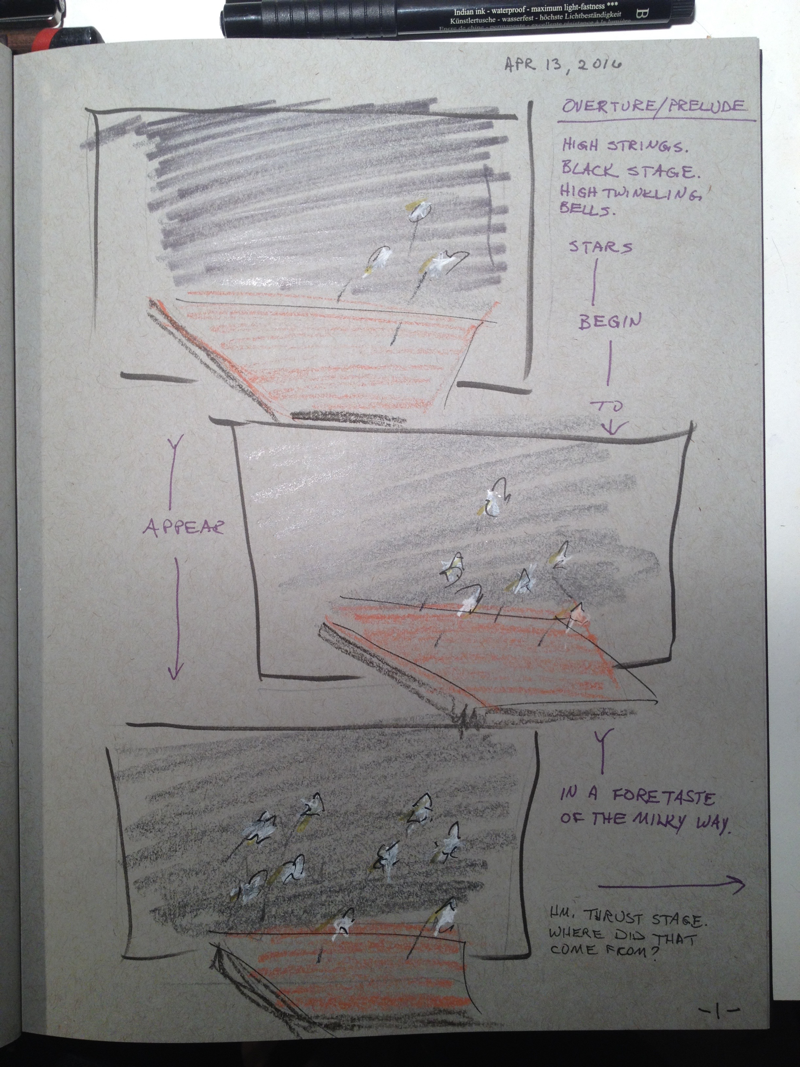
Where it says “appear,” imagine “twinkle on.”
And here’s the music: mp3 Remember, it’s just the first five seconds—only 37 and a half minutes to go!
—————
[1] And remember, if you are looking for a charming, expensive piece to do for a world premiere, I am contactable.
Tomorrow is Nancy Willard’s birthday. (It’s also my son’s birthday, and that of my first girlfriend. Anybody else?)
One of the greatest regrets of my life is that I have been unable so far to get William Blake’s Inn produced. Nancy is such a phenomenal writer and artist, but more than that she is such an unbelievably warm and supportive human being that she deserves to have this work staged and performed all over the country.
When I asked her for permission to set her Newbery Award-winning book to music in 2003, she did not hesitate. As a creative master, she was unafraid of what I might do to her “child”; indeed, she eagerly anticipated the completion of each song and has remained the work’s biggest fan.
In a perfect world, we would be able to workshop William Blake and then give it a full staging—soloists, chorus, adults, children, puppets, projections, orchestra—and present it along with an exhibit of her related artwork. (She actually built the Inn out of cardboard. It’s with all her papers at UMich/Ann Arbor.) And then we would take it on the road to share with the rest of the planet.
I may be exploring new territory with Seven Dreams of Falling, and my magnum opus of SUN TRUE FIRE may be my future towering work of genius, but William Blake’s Inn will always be my favorite child.
To our children we shall say
how we walked the Milky Way.
(If you haven’t before now, go listen to the Epilog. It is probably the best thing I will ever write.)
It is probably unfortunate that the cabin we’re staying in for this year’s Lichtenbergian Retreat has wifi.
Still, it allows me to live blog, kind of, my work—and that’s a time-honored Lichtenbergian principle. Nay, it is the very foundation of Lichtenbergianism, doing something semi-valid in order to avoid the actual work.
9:33 am: I’ve been working for about an hour, poking into the nooks and crannies of Finale 2012. It seems that I buy a new version of Finale every time I have a major thing to work on, which always slows me down while I figure out where Finale hid everything this time. If I were a working composer, I’d go nuts having to relearn all the menus and stuff. For example, up until now you changed the name of a staff in the staff dialog box. But now that’s in the new Score Management window. Feh.
At any rate, I’ve been trying to figure out the best way to set up a template for the reorchestration of William Blake’s Inn, which is my major task this weekend. I think I’ve got it: children, SATB, piano, synth I, synth II, and string quintet. The synths are actually made up of independent staves, since one of the new tricks Finale can do (just in time for this orchestration) is to change instruments midstream, but if you have a “piano” staff, your only choices are other double-staffed instruments like the harp. If you have two independent staves grouped as “Synth I,” then your choices open up to all the other instruments.
So yes, the world premiere of William Blake’s Inn, if it happens now, will be with a reduced orchestra.
Why, you ask? Not to get anybody’s hopes up, but William Blake’s Inn is being considered as the performance we will send to our sister city, Ayr, Scotland. Next June.
So there’s that. Yeah.
Two things have become painfully apparent to me: I should have brought a score to look at, and I should have brought my Cinema Display. The size of the laptop screen is not conducive to zipping through a full orchestral score looking for the part you’re hoping to duplicate. Oh well.
A score would have been helpful in quickly finding where time/key signature changes happen: I can copy and paste the parts from the original to the new template, but all those changes do not come with them. With a piece like “Milky Way,” that’s a pain. Not that I’m going to work on “Milky Way” this weekend. Stick to the simple ones: “Wise Cow,” “Dance,” “Fire,” that kind of thing.
And actually, just stick to porting over the voices and the strings. Even the piano parts can wait for the most part. If I just get the voices/strings laid out in a couple of pieces, then I can start arranging the children’s chorus part, because to be brutally honest, this was never conceived as a piece for children to perform.
More later.
3:38 pm: It’s almost hot tub time. Since this morning, I’ve gotten seven of the fifteen pieces transferred into the new template, which seems kind of slow, but some of these are horrors of multiple time signatures. I have to set up the new blank piece with all the time signatures and key changes ahead of copying and pasting the originals in, or it all goes whacky and it’s easier to start over from scratch.
I have been copying and pasting the piano part as well as the vocals and the strings. I’ve standardized the solo lines, giving them a separate staff above the chorus, whereas before I think I was saving paper by having solos embedded in the chorus staves.
Above all, I’ve been resisting doing any other work, although with “Rabbit Reveals My Room” and “King of Cats Orders an Early Breakfast,” I did stick in some of Synth I’s stuff, because without it there wouldn’t be much accompaniment to go on.
Big question right now: time to do one more, or hit the hot tub?
So we finished singing Song of Wisdom from “Old Turtle” at Lincoln Center’s Avery Fisher Hall and went to the nice dinner reception down the avenue. Good food, open bar, and finally I decided I would go speak to Dr. Tim Seelig, our phenomenal conductor.
He was talking with Rachel Gordon, choral conductor of Northgate High School and one of the soloists of the evening. I slid in and bragged that Rachel was my Susanna in Figaro, and we both said at the same time, “… nearly 10 years ago!” Good times.
Before I could bring up my next topic, however, Tim said, “And how are you doing? How’s that piece of yours?”
Oh. My. He remembered talking to me about William Blake’s Inn when he was in Newnan.
So I plunged right in and asked if I had ever sent him “Blake Leads a Walk on the Milky Way,” because I honestly could not remember if I had. He thought not, because he always responds to those kinds of things.
May I, then? Certainly, he enthused. He’d love to take a look it.
Oh. My.
I figure I’ll give him a week to settle back in with his grandchild, then send it to him. If nothing else, I’ll get an unbiased assessment of its weaknesses.